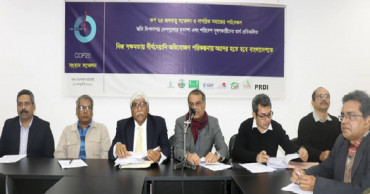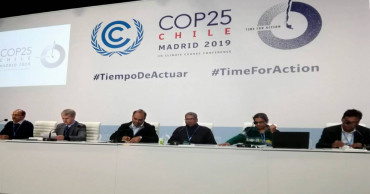civil society leaders
The UN has failed to pressure Myanmar to take back Rohingyas, say civil society leaders
A group of civil society leaders on Wednesday said that the international community, including the United Nations, has completely failed to exert effective pressure on Myanmar to take back the Rohingyas to their homeland.
This emerged during an online discussion meeting organized by Cox's Bazar CSO-NGO Forum (CCNF).
The discussants said Bangladesh is bearing the brunt of the Rohingya crisis even though the fault lies with Myanmar. The international community must pressure Myanmar to take back their nationals.
The meeting, organized by CCNF, a network of around 50 local and national organizations working in Cox's Bazar, was moderated by Rezaul Karim Chowdhury, Co-chair of the forum and Executive Director of COAST Foundation, and Abu Morshed Chowdhury, another Co-chair and Chief Executive of PHALS.
Shireen Haque of Naripokkho, Barrister Manzoor Hasan of BRAC University's Center for Peace and Justice , Disaster Forum's Gowher Nayeem Wahra, YPSA's Md. Arifur Rahman, Sheuli Sharma of Jago Nari Unnayan Sangtsha , Md. Mujibul Rahman of Sushilan, Sangeeta Ghosh of ACLAB and Co-Chair of CCNF and Chief Executive of Mukti Cox's Bazar Bimal Chandra Dey Sarkar and Member Secretary of the Network Md Jahangir Alam also spoke at the event.
Abu Murshed said, there are about 1.2 million Rohingya people living in Bangladesh. Except for a few UN resolutions, there has been no successful effort to return them to Myanmar thus far, which has left the Rohingya population as well as the locals unsure and frustrated. To secure repatriation, formal and informal diplomacy, known as track-2 diplomacy, should be prioritized, he said.
Read: UNHCR seeks more support from international community for Rohingyas
Bimal Chandra said, nearly half of the Rohingya population, are children and young adults. This sizable population must participate in a variety of camp activities and receive technical and life skills training. This will lessen their likelihood of going astray, and even if they return to Myanmar, they will be able to establish respectable jobs.
Md. Mujibur said, the construction of the camp caused harm to around 6,000 acres of mountainous terrain and 2,000 acres of forest. A little over 2500 families working in social forestry did not get compensation. The water level is going down. Use of plastic in camps should be banned since it is such a significant problem. An Environmental Pool Fund should be created for environmental restoration.
Sangeeta Ghosh said reproductive health services should be ensured for teenagers.
Md. Jahangir Alam said, the local government institutions should be involved in the planning and execution of the Rohingya program and the local organizations should take lead in carrying out operations on the ground to cut costs. At present, the participation of local organizations in the Rohingya program is insufficient.
Md. Arifur said, intelligence gathering should be intensified in the camps to prevent the formation of any new religious extremist organizations. If such groups emerge within the camp, the country will be in jeopardy.
General Secretary of Ukhiya Reporters Unity, Rafiq Uddin, said that although the Rohingya camp recently got help in repairing the Rohingya houses damaged by fire, the local 14 families there did not get any help. Special attention should also be given to all affected local families.
Gowher Nayeem said that repatriation should be kept at the centre of the Rohingya programme. A national strategy for resettlement should be developed and the implementation progress of the plan should be regularly reviewed. Also, the communication between the civil societies of the respective countries including Bangladesh and Myanmar should be increased.
Barrister Manzoor said that the international community, especially the United Nations, has failed in repatriation. ASEAN also failed in this regard. The Rohingya crisis has become a protracted crisis, requiring regional and international initiatives. There is no alternative to implementing a localization roadmap to deal with the crisis as funding is dwindling.
Shirin Haque said that until the repatriation, special programmes should be implemented for the women of the Rohingya camps. Tree plantation program should be implemented in camps.
Rezaul Karim said that the comprehensive development programme of the government is being implemented for Cox's Bazar. Up to 70 projects totalling roughly $3.3 billion are now being carried out. The development efforts in Cox's Bazar must be kept safe from all dangers in order to preserve the nation's wealth.
3 years ago
Special allocation in budget required for SW coastal districts: Civil society leaders
Civil society leaders on Tuesday demanded special allocation in the 2022-23 fiscal's budget for facing natural disasters in the country's southwestern coastal areas, which are very vulnerable to climate change.
They also demanded that Satkhira, Khulna and Bagerhat districts be declared as disaster-prone areas, and also to take necessary measures to protect the people and their property from the damage caused by natural calamities.
Also read:Kamal thanks ADB for budget aid during pandemic
The demands were made from a press conference in Dhaka Reporters Unity jointly organised by Local Environment Development and Agricultural Research Society (LEDARS), a non-government organisation, and Sundarbans and Coastal Belts Protection Movement (SCBPM).
LEDARS' executive director Mohan Kumar Mandal presented his keynote in the press conference moderated by Coordinator of SCBPM Nikhil Chandra Bhadra.
The press conference was informed that in the 16 years from 2004 to 2020, the average annual loss per family in the coastal areas of Satkhira and Khulna was Tk 102,479 (over Tk 1 lakh). Families suffered a maximum loss of Tk 50.40 lakh and a minimum loss of Tk 45,200.
Bangladesh faced a total of 198 major natural disasters in between 1991 and 2020 due to climate change, which created different crises including livelihood, resources, food, water, and shelter of the people of the coastal belts.
Among others, Member Secretary of Unnayan Dhara Trust Aminur Rasul Babul, former president of DRU Rafiqul Islam Azad, BMA office secretary Dr. Md. Shahidullah, SCAN general secretary Moniruzzaman Mukul, SKUS chairman Jasmine Prema, Faith in Action Program Coordinator Timon Barai also spoke at the press conference.
In his presentation, Mohan Kumar Mandal urged the government to implement the undertaken government's projects, including construction of sustainable coastal embankments and supply of potable water and taking new projects for the people of disaster-prone areas.
Also read: National Budget to be placed in Parliament on June 9 : Mustafa Kamal
Speakers raised demands at the press conference include setting up adequate cyclone shelters and preventive measures in the coastal areas, ensuring sustainable solution for coastal potable water and taking effective measures to protect the Sundarbans.
The other demands also include formation of a coastal development board to look after the coastal people facing frequent natural disasters, fragile infrastructure, poverty, long-term salinity and endangered agriculture.
3 years ago
COP 25 served interests of polluters: Civil Society
Terming the outcomes of COP25 frustrating, civil society members at a press conference in the city on Saturday said it served the interests of the polluters.
6 years ago
MVC civil society leaders for actions for 1.5 degree temp goal
Civil society leaders of most vulnerable countries (MVC) have demanded urgent actions by developed countries to reduce the greenhouse gases to keep global warming rise below 1.5 degree Celsius.
6 years ago
.jpg)




